
A utopia or eutopia typically describes an imaginary community or society that possesses highly desirable or nearly perfect qualities for its members. It was coined by Sir Thomas More for his 1516 book Utopia, describing a fictional island society in the New World. However, it may also denote an intentional community. In common parlance, the word or its adjectival form may be used synonymously with "impossible", "far-fetched" or "deluded".
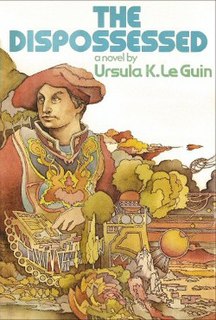
The Dispossessed is a 1974 anarchist utopian science fiction novel by American writer Ursula K. Le Guin, set in the fictional universe of the seven novels of the Hainish Cycle. It won the Hugo, Locus and Nebula Awards for Best Novel in 1975. It achieved a degree of literary recognition unusual for science fiction due to its exploration of themes such as anarchism and revolutionary societies, capitalism, and individualism and collectivism.
Utopian and dystopian fiction are genres of speculative fiction that explore social and political structures. Utopian fiction portrays a setting that agrees with the author's ethos, having various attributes of another reality intended to appeal to readers. Dystopian fiction offers the opposite: the portrayal of a setting that completely disagrees with the author's ethos. Some novels combine both genres, often as a metaphor for the different directions humanity can take depending on its choices, ending up with one of two possible futures. Both utopias and dystopias are commonly found in science fiction and other types of speculative fiction.
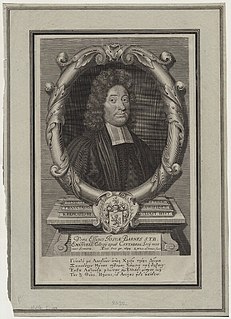
Joshua Barnes FRS, was an English scholar. His work Gerania; a New Discovery of a Little Sort of People, anciently discoursed of, called Pygmies (1675) was an Utopian romance.
This article contains information about the literary events and publications of 1675.

Technological utopianism is any ideology based on the premise that advances in science and technology could and should bring about a utopia, or at least help to fulfill one or another utopian ideal.
The exploration of politics in science fiction is arguably older than the identification of the genre. One of the earliest works of modern science fiction, H. G. Wells’ The Time Machine, is an extrapolation of the class structure of the United Kingdom of his time, an extreme form of social Darwinism; during tens of thousands of years, human beings have evolved into two different species based on their social class.
The Utopian language is the language of the fictional land of Utopia, as described in Thomas More's Utopia. A brief sample of the constructed language is found in an addendum to More's book, written by his friend Peter Giles. Pretending to be factual, the book does not name the creator of the language; both More and Giles have been alternately credited, with Giles often thought to have designed the alphabet.
Ruth Levitas is Emeritus Professor in the Department of Sociology at the University of Bristol. She is well known internationally for her research on utopia and utopian studies.
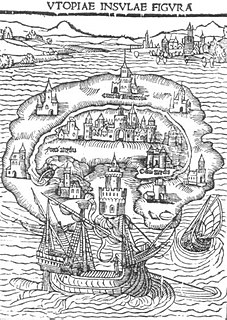
Utopia is a work of fiction and socio-political satire by Thomas More (1478–1535), written in Latin and published in 1516. The book is a frame narrative primarily depicting a fictional island society and its religious, social, and political customs. Many aspects of More's description of Utopia are reminiscent of life in monasteries.
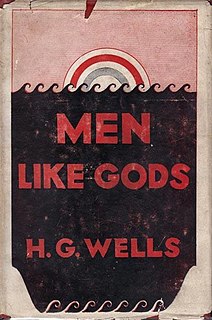
Men Like Gods (1923) is a novel, referred to by the author as a "scientific fantasy", by English writer H. G. Wells. It features a utopia located in a parallel universe.

A Modern Utopia is a 1905 novel by H. G. Wells.
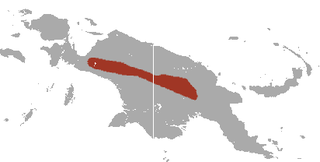
The pygmy ringtail possum is a species of marsupial in the family Pseudocheiridae. It is found in the montane forest regions of Papua New Guinea and West Papua, Indonesia. They are "widespread along the Central Cordillera" and live at elevations between 1,500 and 3,600 metres above sea level.”
An imaginary voyage is a kind of narrative in which utopian or satirical representation is put into a fictional frame of travel account.

A dystopia is a speculated community or society that is undesirable or frightening. It is often treated as an antonym of utopia, a term that was coined by Sir Thomas More and figures as the title of his best known work, published in 1516, which created a blueprint for an idealistic society with minimal crime, violence and poverty. The relationship between utopia and dystopia is in actuality not one simple opposition, as many utopian elements and components are found in dystopias as well, and vice versa.

Cyber-utopianism or web-utopianism or digital utopianism or utopian internet is a subcategory of technological utopianism and the belief that online communication helps bring about a more decentralized, democratic, and libertarian society. The desired values may also be privacy and anonymity, freedom of expression, access to culture and information or also socialist ideals leading to digital socialism.
Utopia is a reality series that premiered on Fox on September 7, 2014. Based on the original Dutch series of the same name and created by John de Mol, the series follows a group of people who attempt to maintain a society in a remote area. Conrad Green was its executive producer. Originally scheduled for two nights per week, Tuesday and Friday, on October 2, 2014, Fox announced that Utopia was pulled from Tuesday nights, and would air only on Friday nights. On November 2, 2014, the show was cancelled after airing weeks of what was promoted as a year-long project. It is estimated that Fox paid $50 million to develop the show.

Utopian socialism is the term often used to describe the first current of modern socialism and socialist thought as exemplified by the work of Henri de Saint-Simon, Charles Fourier, Étienne Cabet, and Robert Owen. Utopian socialism is often described as the presentation of visions and outlines for imaginary or futuristic ideal societies, with positive ideals being the main reason for moving society in such a direction. Later socialists and critics of utopian socialism viewed utopian socialism as not being grounded in actual material conditions of existing society. These visions of ideal societies competed with revolutionary and social democratic movements.

Real utopian sociology is an emancipatory social science created and practiced by Erik Olin Wright, a utopian studies scholar. The apparent contradiction in its name is intentional: this sociology seeks to find existing utopian projects and evaluate their potential to replace systems of domination, particularly as an anti-capitalism strategy. Simply put, real utopian sociology is the study of feasible utopian models for society and pathways to achieve them.









